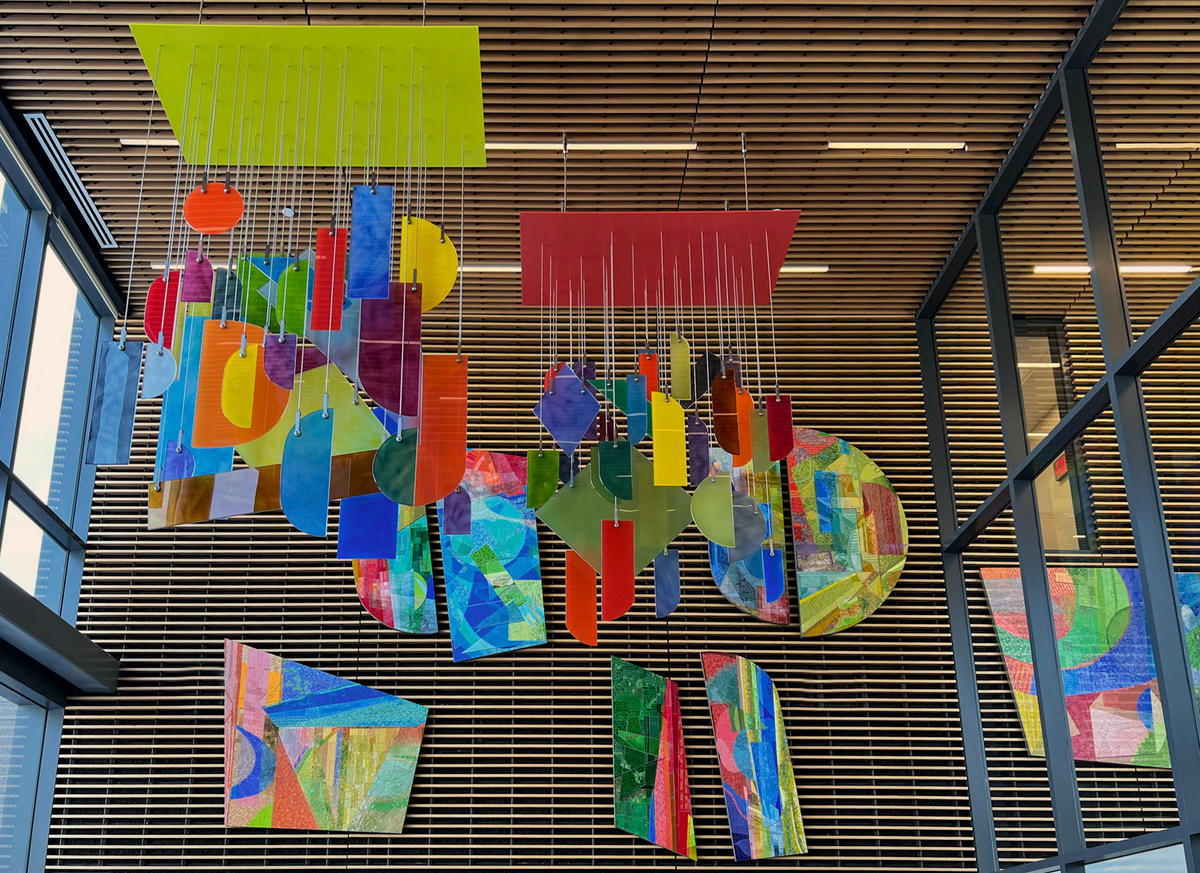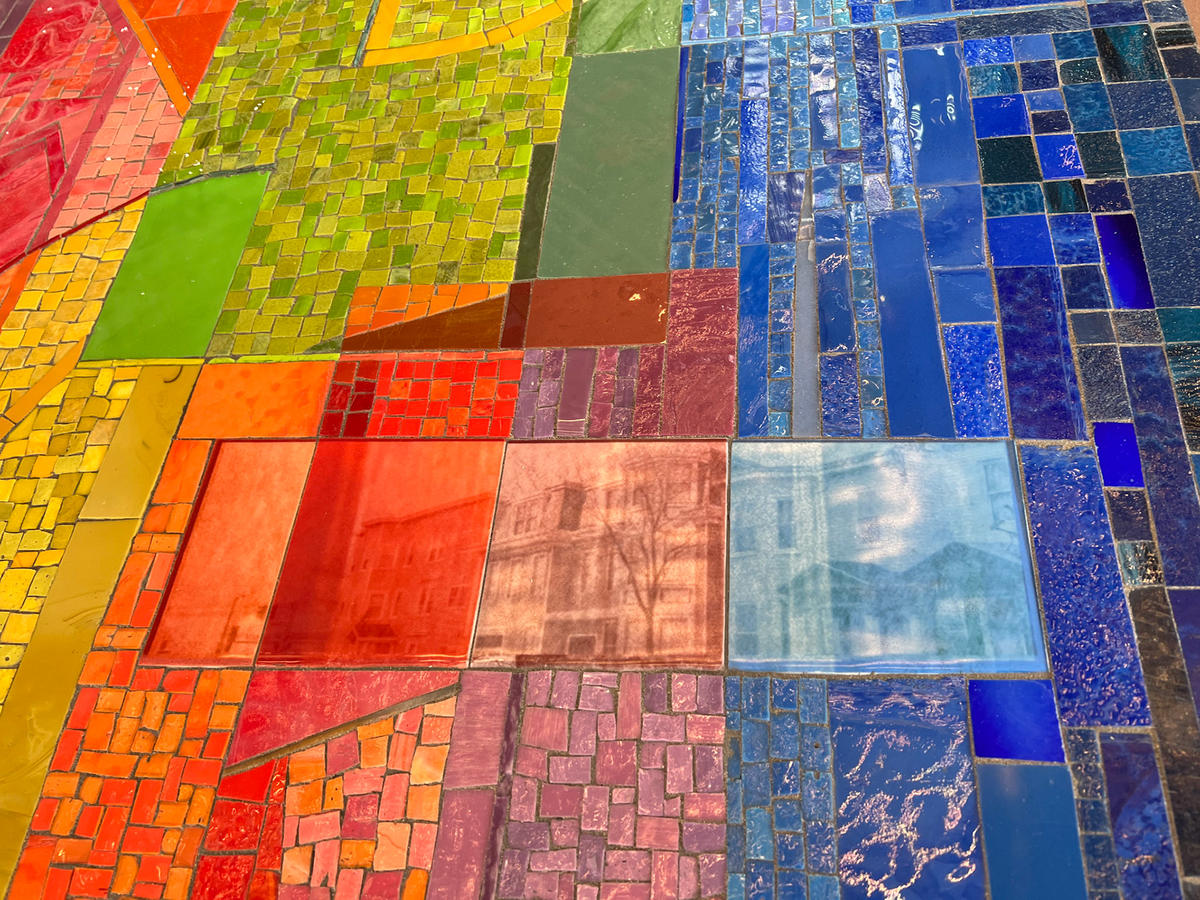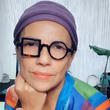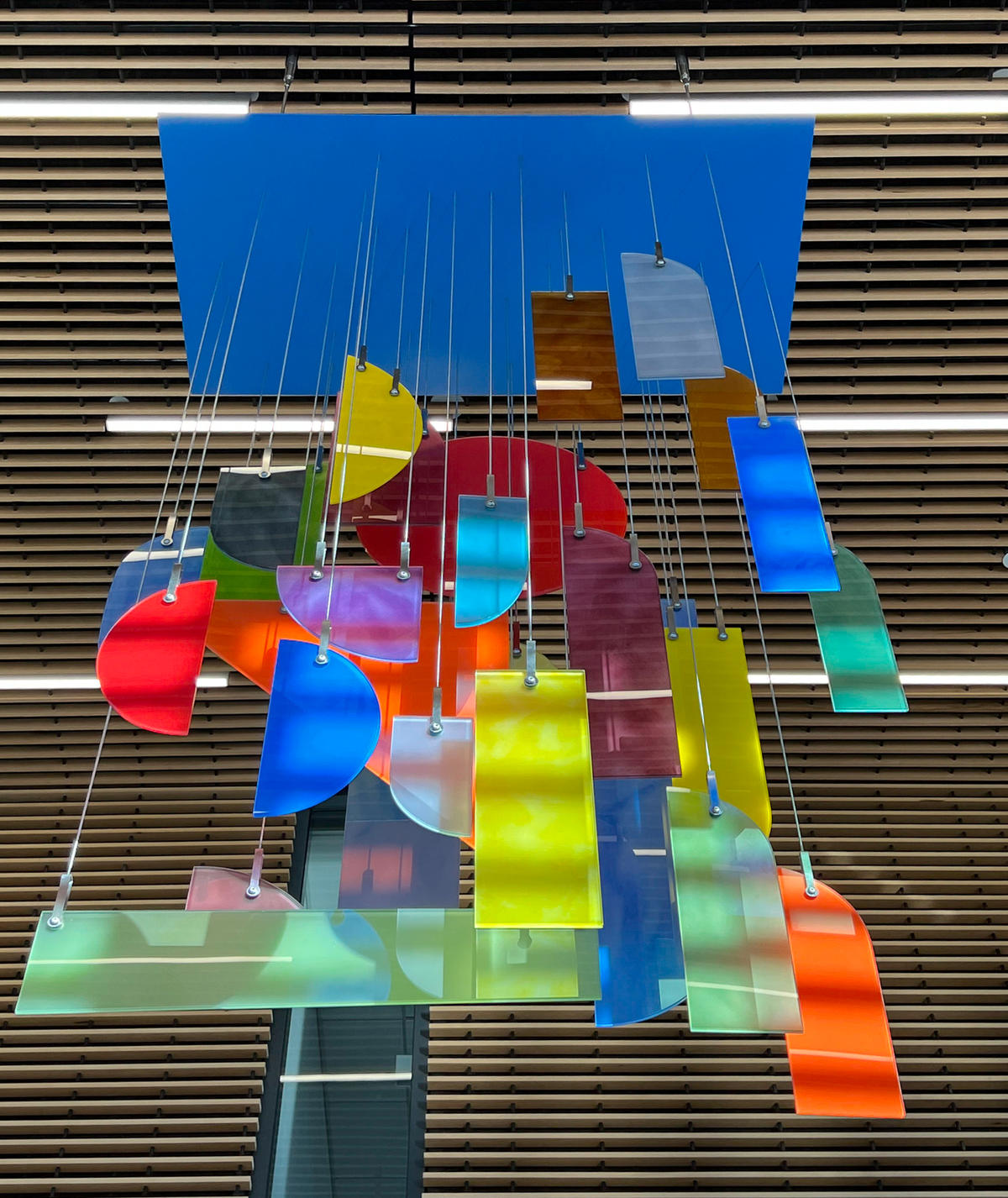'UNUS MUNDUS' public art project
This project was installed at the Area A-7 Police Station in East Boston in March 2022. It was created by artist Monika Bravo.
According to artist Monika Bravo, “the spirit of the piece is the potential for dialogue.”
Artwork Details
"UNUS MUNDUS" (Latin for “One World”) consists of mosaics and mobiles. The mosaics, composed of different shapes on two walls, refer to the original topography of East Boston. The neighborhood used to be five separate islands that were later covered in landfill, integrating separate elements into a whole. Images of historical photographs and vintage maps are embedded within the artwork. They depict glimpses of:
- demolished parks
- shipyards
- an eagle
- the Watchmen’s Police Department, and
- aerial images of the airport.
These images tie in East Boston's history, economy, and culture in layers of meaning. The mobile’s playfulness brings diversity to life with the metaphors of the mosaic (a whole from parts), glass (transparency), and a play of light. The project appears different from every angle. It invites the opportunity for the fusion of unique vantage points. As the viewer moves around, they can envision what we can overcome as a society while seeing each other’s differences. The mesmerizing environment invites the audience to mutual participation.
Key Collaborators
- Photos: Monika Bravo + Felix Bartesch
- Fabricators: Mayer of Munich, Tripyramid
- Architects: Leers Weinzapfel Associates
- Installers: BRM Production and Felix Bartesch
Artist Statement
"I embody my own perspective and no longer seek 'truth'; my vision is a synthesis of all disciplines, guiding me to manifest a reality that matches my desire to evolve. With deep commitment, I create mesmerizing environments for public spaces. I enjoy directing and producing diverse projects, from complex multi-media installations and public art commissions to artists’ books, textile design, and community workshops – thus, I see no boundaries between the applied and fine arts.
With Courage, Find a Vocation Embodying Your Perspective to Serve in Community. The shapes of the suspended float glass are abstractions of these words, using artist Josef Albers’ modular typeface 'Kombinations-Schrift', created in 1923 for the Bauhaus movement. It consists of three shapes: a square, a circle, and a quarter circle of the same radius organized on a grid.
My intention for this piece is to invite viewers to move around the space, embodying the various perspectives, seeing it as new, and in that be in the potential for dialogue. My main focus is authenticity, with the piece serving as an invitation to experience the material from its different vantage points, incorporating beauty as a lofty expression of materiality, and the freedom felt by not trading authenticity for safety.
Part of the process of conceptualizing the piece was a community engagement workshop in which I created a whimsical space to explore and identify the differences in emotions, perspectives, and sensations in the body."
The Workshop: Dia-logos in action
Over three days, community members were involved in the creation of the project through a playful workshop. Participants engaged in the embodiment of sovereignty and authenticity. They noticed and identified differences in emotions, perspectives, and sensations in the body. Using accessible, whimsical animations and characters, the community members:
- practiced deep listening
- explored differences and similarities (shadow work), and
- constructed mobiles that demonstrated the delicacy and nuance necessary to achieve balance.
The workshops showed the need for understanding language to achieve true dialogue.
Dialogue
Color was used for contrast and to highlight that everyone is meant to be unique. In truly seeing each other and recognizing our differences, we can engage in dialogue. Each time the viewer walks around the piece, they can discover something new and embody a new perspective. The color is a continual invitation to find meaning.
Language
Monika used specific language in the project. Words bring to life the intention of both the installation as well as the workshop that preceded the creation of the mobiles. Words used for this project were:
- SERVE
- En-Joy
- Courage
- Communion
- Vocation
- em-Body, and
- Perspective.
These words are captured abstractly in the artwork.
Symbolism
"UNUS MUNDUS" is the concept of a unified reality from which everything emerges and to which everything returns. Designated local names, such as Eagle Hill and Condor Street, and symbolic animals from the USA and Monika's native Colombia are symbols of vision and perspective. The birds can see from very far away in an abstract way, but can also hone in and focus where interested. This is symbolic of how the unique experiences of the individual and the collective intertwine. Various components have been positioned in a way that, in order to be seen, viewers have to move their bodies. In doing so, they embody and discover a new perspective.
About the artist
About the artistProject details
Project Context
The City of Boston released a Call to Artists for public artwork to complement the construction of the new Area A-7 police station. The 27,505 square-foot site includes:
- a community room
- offices
- fitness and locker area for police personnel
- temporary holding facilities
- a vehicle maintenance bay, and
- parking for police personnel.
The building is at the intersection of two busy streets. The location is at an area where the residential neighborhood meets the industrial area, with a view of the Chelsea River. The building is intended to welcome the community while also holding a civic presence. The total budget for the public art project was $450,000, including fabrication and installation.
Project Site
The City identified several potential sites for the artwork. Monika selected the wall and ceiling of the entrance lobby, as well as the wall of the community room to be the site of the artwork.
Community Values
During the Call to Artists process, we encouraged applicants to consider these three qualities of the East Boston neighborhood:
Immigration:
East Boston has a deep history with several immigrant communities. There are several local symbols of immigrants, including:
- the To Immigrants with Love murals, and
- The Golden Staircase, a plain concrete stairway that new Bostonians would climb up upon arriving to the United States.
Climate Change:
East Boston is experiencing the negative effects of climate change largely because of its geographic location. The City is partnering with local nonprofits to reduce the impact on the neighborhood.
Community:
Because East Boston is somewhat isolated from other neighborhoods in the City, the community has a strong neighborhood identity. The police officers and Boston Police Department staff have a close relationship with residents. This relationship reflects the tight-knit nature of East Boston, and Boston’s citywide commitment to community policing.






